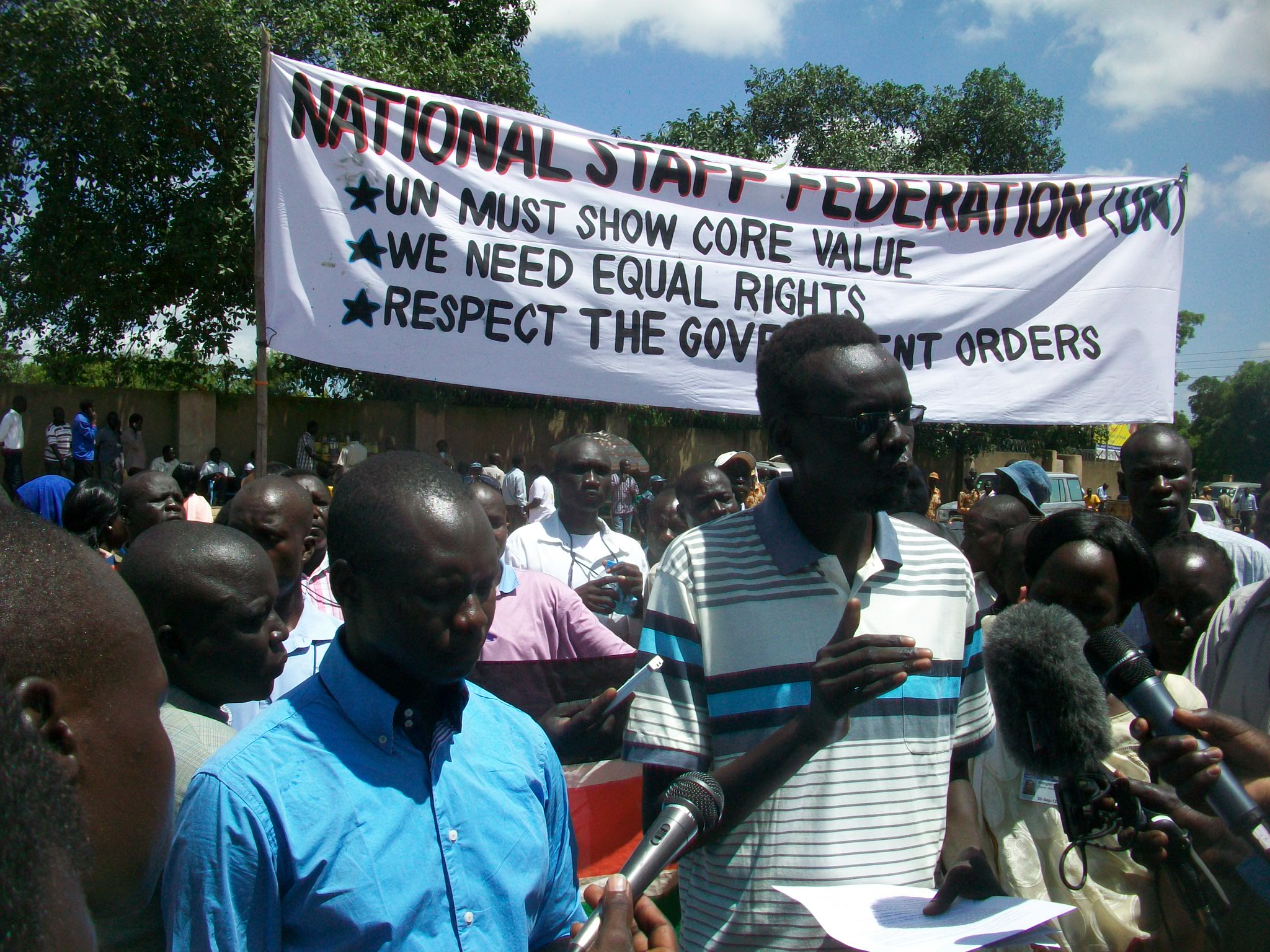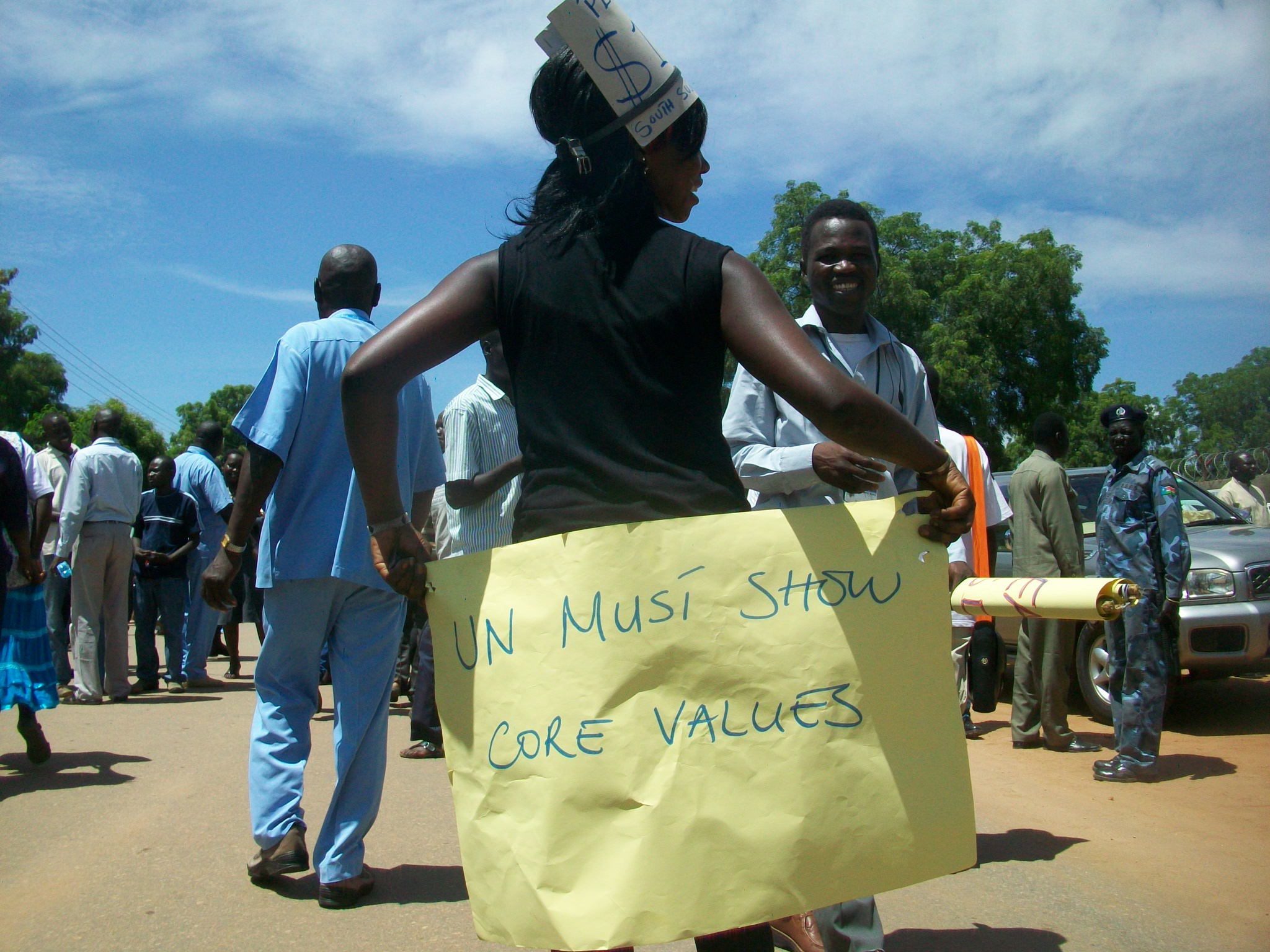UN national staff protest against low pay, poor work conditions
August 13, 2012 (JUBA) – At least two hundred national staff working for the United Nations on Monday protested in Juba, the South Sudan capital over what they claimed was their employer’s alleged failure to address their concerns amidst worsening economic situations.

The visibly angry staffs, under the UN national staff federation, also prepared a strongly-worded petition denouncing that they said was the poor staff relations and alleged attempts by the various UN organizations to undermine plans put in place by the government.
The federation, formed over a year ago, reportedly comprises of up to 5,300 South Sudanese nationals working with the various UN entities.
Mal Maker, the spokesperson for the federation told journalists that their strike, which took place nationwide, was mainly inspired by poor working conditions, mistreatment of national staffs and deterioration in the country’s economy.
“We have asked the UN organisations in South Sudan to implements special measures for a certain period within its capabilities and in line with the provisions to help lessen this harsh state of affairs, but [we] have received no convincing response,” he told journalists.
In a strongly-worded petition, the federation also reminded the UN of the two circulars reportedly given to all international organisations and diplomatic missions in the country.
The government, in the circular, calls for the termination of contracts of all foreigners employed in the country as national staffs and that all staffs working in international organisations are paid in the same currency.
“As national staff, we are very much aggrieved with this lack of concern and poor response to such demand which had revealed the highest [level] of disrespect to us and our government…” partly reads the petition, addressed to Hilde Johnson, the UN Special Representative of the Secretary General (SRSG).
Transport along the ministries road in Juba was paralysed for half of the day as the protesting staffs, majority of them clad in their identity cards, gathered outside the UN Development Programme (UNDP) premises.

Dozens of anti-riot Policemen were also deployed in the area, occasionally making up and down movements as they closely monitored events.
“The UN must show core values. We need equal rights. They [UN] must respect our government,” reads a placard held by one of the protestors.
“The UN rate should come down to 2.2 SSP,” read another.
Some of the national staffs Sudan Tribune talked to also complained of alleged mistreatment by these international organizations, which they claimed, was one of the reasons that triggered Monday’s protest.
“First mistreatment is if you are mentally tortured, it is already a mistreatment. We have our staffs who are working in conditions are not very conducive. We want the UN to ensure that these conditions are met,” Maker said.
An international staff, who preferred anonymity, described the demands of the South Sudanese nationals as “unrealistic” under the UN systems governing locally employed staffs.
“They should ask for salary increments, but not demand to be paid in dollars,” she told Sudan Tribune, adding that; “These people should know that they work for a system that has international standards, which needs to be adhered to by its employees.”
Kouider Zerrouk, the UN mission spokesperson told Sudan Tribune that the national staff were right to express their grievances, adding that such an experience has not only been witnessed in South Sudan alone, but also happens in other parts of the world.
He however said the SRSG has engaged the national staff federation in talks to resolve the pending issues, while the UN headquarters in New York, he added, has already been notified of about the matter.
“As you know, this is a process that is likely to take some time, but we are optimistic that a solution to the current problem will be reached,” Zerrouk said by phone.
He further emphasized the important role national staffs play in the day to day operations of the UN, adding that the SRSG, working in partnership with the concerned government institutions, remains committed toward helping these staff overcome these period of bad economic times.
Meanwhile, the UN staff, who resume normal work on Tuesday, have given the concerned authorities until Friday to respond to their demand, or face dire consequences.
As well as inflation won on the main issues is access to dollars so that they can send money to family abroad, especially if they are studying in Kenya or Uganda. This means buying dollars at way above the exchange rate on the black market.
INTERNATIONAL STAFF REACTION
An international official for UNMISS, who spoke to Sudan Tribune on the condition of anonymity, said that she personally had never seen international staff mistreating national staff.
There was she, said a general impression that “national staff do not work very
hard, and that they are always leaving early, not showing up, take
long lunches, etc.” However, she added that this complaint is common to all United Nations mission and not unique to South Sudan.
From the perspective of international staff “the atmosphere is not tense”, she added. UN sources have told Sudan Tribune that they believed there was no need to deploy peacekeepers outside UN compounds during Monday’s demonstration.
In terms of the protestors demands the UNMISS employee said that “most internationals see both sides” of the pay dispute. “Of course inflation is terrible but should the UN be responsible for this? Why should the UN prop up South Sudan’s currency at an unsustainable level?”
The UN worker said that the “contracts issue is huge” with many national staff on short-term three-month contracts that continually get renewed, some being in the situation for two years.
(ST)
